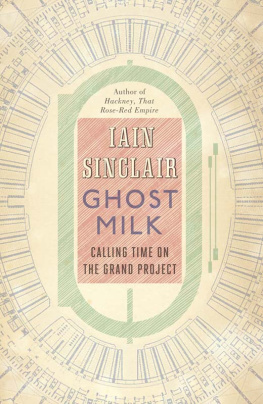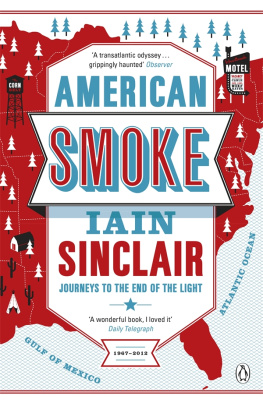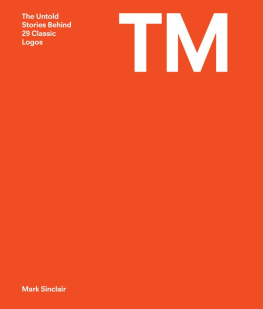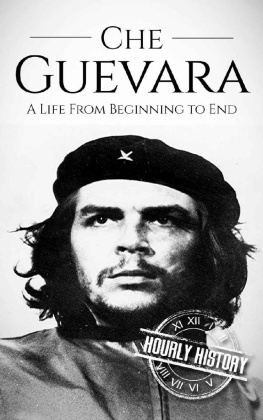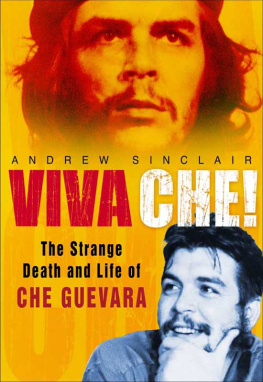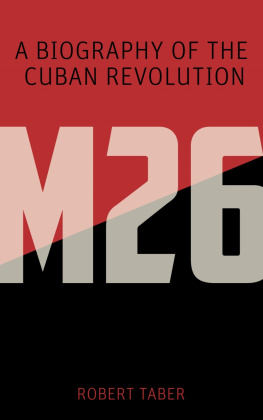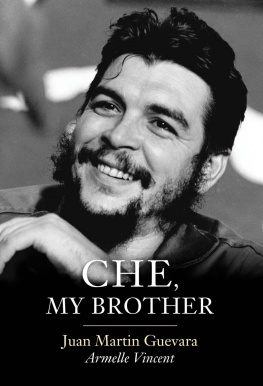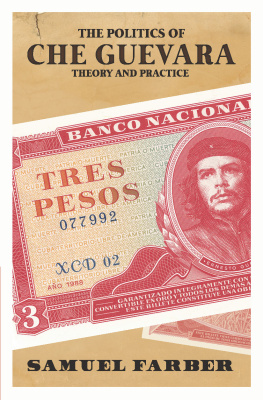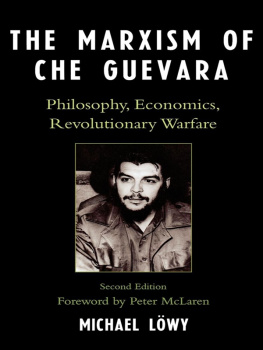Sinclair - Che Guevara
Here you can read online Sinclair - Che Guevara full text of the book (entire story) in english for free. Download pdf and epub, get meaning, cover and reviews about this ebook. City: New York, year: 2013, publisher: The History Press, genre: Politics. Description of the work, (preface) as well as reviews are available. Best literature library LitArk.com created for fans of good reading and offers a wide selection of genres:
Romance novel
Science fiction
Adventure
Detective
Science
History
Home and family
Prose
Art
Politics
Computer
Non-fiction
Religion
Business
Children
Humor
Choose a favorite category and find really read worthwhile books. Enjoy immersion in the world of imagination, feel the emotions of the characters or learn something new for yourself, make an fascinating discovery.

Che Guevara: summary, description and annotation
We offer to read an annotation, description, summary or preface (depends on what the author of the book "Che Guevara" wrote himself). If you haven't found the necessary information about the book — write in the comments, we will try to find it.
Che Guevara — read online for free the complete book (whole text) full work
Below is the text of the book, divided by pages. System saving the place of the last page read, allows you to conveniently read the book "Che Guevara" online for free, without having to search again every time where you left off. Put a bookmark, and you can go to the page where you finished reading at any time.
Font size:
Interval:
Bookmark:
Che Guevara

Series Editor C.S. Nicholls
Highly readable brief lives of those who have played a significant part in history, and whose contributions still influence contemporary culture.

ANDREW SINCLAIR
THE HISTORY PRESS
First published in 1998 by Sutton Publishing
Reprinted in 2001, 2002, 2003, 2004 (twice), 2006
This edition first published in 2007
The History Press
The Mill, Brimscombe Port
Stroud, Gloucestershire, GL5 2QG
www.thehistorypress.co.uk
This ebook edition first published in 2013
All rights reserved
Andrew Sinclair, 1998, 2007, 2013
The right of Andrew Sinclair to be identified as the Author of this work has been asserted in accordance with the Copyrights, Designs and Patents Act 1988.
This ebook is copyright material and must not be copied, reproduced, transferred, distributed, leased, licensed or publicly performed or used in any way except as specifically permitted in writing by the publishers, as allowed under the terms and conditions under which it was purchased or as strictly permitted by applicable copyright law. Any unauthorised distribution or use of this text may be a direct infringement of the authors and publishers rights, and those responsible may be liable in law accordingly.
EPUB ISBN 978 0 7524 9465 4
Original typesetting by The History Press
1928 | 14 June. Ernesto (Che) Guevara de la Serna is born in Rosario, Argentina, the first of five children. |
1932 | Because of Ches asthma, the Guevara family moves to Alta Gracia. |
1948 | Studies medicine in Buenos Aires. |
19512 | Travels with Alberto Granado by motorcycle around South and Central America. |
1953 | Qualifies as a doctor and leaves Argentina. Observes the effects of the Bolivian Revolution. |
1954 | Analyses the American-backed coup against the radical government of Jacobo Arbenz in Guatemala. Escaping to Mexico, he enlists and trains with the Cuban revolutionaries led by Fidel Castro. Marries a Peruvian revolutionary, Hilda Gadea, and has a daughter, Hildita. |
1956 | Lands with 82 Cuban exiles on the yacht Granma and begins from the Sierra Maestra a guerrilla war against the dictator Fulgencio Batista. |
1958 | Meets his second wife, Aleida March de la Torre. |
1959 | With the flight of Batista and the fall of Havana, Fidel Castro sets up a revolutionary government in Cuba. Che is made the Governor of the National Bank and tries to apply socialist economic planning to Cuban conditions. |
1961 | Minister for Industry. Castros regime withstands the American-backed invasion by Cuban exiles at the Bay of Pigs. Che becomes a roving ambassador for Castro round the Communist and socialist powers, and across the non-aligned and Third World countries during the Cold War between the United States and Russia. |
1962 | After the Cuban Missile Crisis, Che turns against Russia, the chief supporter of the Cuban economy, in favour of the rural revolution of Mao Zedong in China. |
1965 | Leaves Cuba to lead the international revolution against imperialism. Travels through Africa and is defeated in the Congo by western mercenaries. |
1966 | Returns to the Caribbean and Latin America to encourage armed revolutions there. Increasingly estranged from Cuban and Russian policy, he leaves to begin a guerrilla war in Bolivia. |
1967 | After training and fighting for nine months, the failing Guevara is captured on 8 October 1967 and executed the following day. |
1968 | Across the world, student and urban revolutions break out, inspired by the example of Che Guevara. They are all suppressed by government forces. |
I was born in Argentina, I fought in Cuba, and I began to be a revolutionary in Guatemala. These words summed up what Che Guevara called his autobiographical synthesis. They also described a continent always in tension between reactionary governments and utopian rebels. Guevara was the first man since Simon Bolvar with a serious plan to unite the squabbling neighbours of Latin America. His own life displayed all the contradictions of his place and time.
He was the child of aristocrats, the first son of Ernesto Guevara Lynch and Celia de la Serna y Llosa, one of whose family had been a Spanish Viceroy of Peru, another a celebrated Argentinian general. The Spanish and Irish Guevaras and Lynchs had come as immigrants to Argentina twelve generations before, while the de la Sernas had much property and radical sympathies. Che Guevaras grandmother, Ana Lynch, also had American blood and was born in California, and his mother Celia, with her reforming beliefs, was the dominant influence on Ches life until he met Fidel Castro.
Ernesto Guevara de la Serna was born prematurely on 14 June 1928 in his fathers birthplace at Rosario: he was later nicknamed Che. Subject to pneumonia and asthma, he was taken to the mountains at Alta Gracia on the foothills of the Crdoba Sierra to help his breathing. His mother Celia taught the wheezing boy to read and write, while his father pursued his business in construction engineering and shipbuilding. Che went briefly to state schools. His radical mother helped him to get on with whoever was there, but the huge difference between the privileged children like himself and the rest of his schoolmates from poor backgrounds was made clear. His uncle, the poet Cayetano Crdova Itrburu, a member of the Communist Party, reported on the Spanish Civil War, sending back to Argentina his dispatches from the Republican Front. These influenced the young Che, who never revolted against his free-thinking home, but against the oppression of his continent. As Ricardo Rojo, a friend of the family, testified, This home conditioning naturally led to a sense of rebelliousness, which, once he could understand the social problems of South America, was to make Che into a revolutionary.
Che acted as if he were a youth as a boy and a man as a youth. A classmate found him incredibly sure of himself and totally independent in his opinions... very dynamic, restless and unconventional.made Ches later assertion plausible, that a man at fifteen already knows what he wants to die for and is not afraid of giving his life if he has found an ideal which makes the sacrifice easy.
However, Che had not yet found an ideal. With General Francos victory in Spain, Fascist movements emerged in many South American nations. Against the reactionaries stood the Guevara family, who founded a local branch of Accin Argentina and enrolled Che as a youth member. With the outbreak of the Second World War, these radical groups opposed the local backers of Hitler. Accin Argentina also opposed the rise to power of Colonel Juan Domingo Pern after the end of the global conflict, although Che was then more interested in sport than politics. He learned to play football and rugby, as a scrum-half, although his asthma often forced him to leave the field. By temperament, he looked on difficulties as tests of will. Disabilities were to be defeated, barriers to be broken. He reduced a six-year university course to three years, passing sixteen major examinations in six months in spite of forty-five serious asthma attacks. His aunt said of this time, We would listen to him gasping, studying as he lay on the floor to ease his breathing, but he never complained. For By the greatest irony of all, a board of army doctors declared him unfit for any sort of military service, once he was eighteen. His training in warfare had to wait a while. There is justice after all, his mother later said.
Next pageFont size:
Interval:
Bookmark:
Similar books «Che Guevara»
Look at similar books to Che Guevara. We have selected literature similar in name and meaning in the hope of providing readers with more options to find new, interesting, not yet read works.
Discussion, reviews of the book Che Guevara and just readers' own opinions. Leave your comments, write what you think about the work, its meaning or the main characters. Specify what exactly you liked and what you didn't like, and why you think so.


